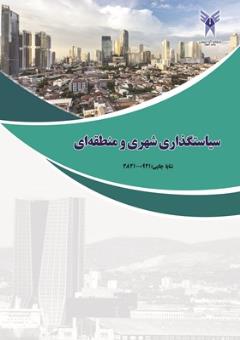سیاستگذاری و تبیین جامعهشناختی آموزش جامعهپذیری فردی-اجتماعی زنان سرپرست خانوار تحت پوشش سازمان بهزیستی شهر تهران در توانمندسازی و اشتغال پایدار
محورهای موضوعی : جغرافیا
بهاره روزیخوار
1
![]() ,
بهرام قدیمی
2
*
,
مهرداد نوابخش
3
,
بهرام قدیمی
2
*
,
مهرداد نوابخش
3
1 - دانشجوی دکتری، گروه علوم اجتماعی، واحد علوم و تحقیقات، دانشگاه آزاد اسلامی، تهران، ایران
2 - نویسنده مسئول، دانشیار گروه جامعهشناسی، واحد علوم و تحقیقات، دانشگاه آزاد اسلامی، تهران، ایران
3 - استاد، گروه جامعهشناسی، واحد علوم و تحقیقات، دانشگاه آزاد اسلامی، تهران، ایران
کلید واژه: سیاستگذاری, توانمندسازی, اشتغال پایدار, آموزش جامعهپذیری, فردی-اجتماعی, زنان سرپرست خانوار,
چکیده مقاله :
هدف: مقاله حاضر با هدف سیاستگذاری و تبیین جامعهشناختی آموزش جامعهپذیری فردی-اجتماعی زنان سرپرست خانوار تحت پوشش سازمان بهزیستی شهر تهران در توانمندسازی و اشتغال پایدار در سال 1401 انجام شد. روش: روش تحقیق پیمایشی از نوع همبستگی میباشد. جامعه و نمونه: جامعه آماری زنان سرپرست خانوار تهرانی تحت پوشش سازمان بهزیستی کشور در طول سالهای 1395 لغایت 1399 به تعداد700 نفر میباشد که به روش تصادفی نسبتی و با استفاده از فرمول کوکران 248 نفر مورد مطالعه قرار گرفتند. ابزار: ابزار اندازهگیری پرسشنامههای محققساخته بود. اعتبار و پایایی: اعتبار ابزار از طریق اعتبار صوری و پایایی با آلفای کرونباخ محاسبه و تایید شدند. یافتهها: نتایج ضریب همبستگی پیرسون نشان از وجود رابطه مستقیم بین آموزش جامعهپذیری فردی-اجتماعی و مولفههای آن با توانمندسازی و اشتغال پایدار زنان بود. نتایج رگرسیون چندگانه و تحلیل مسیر نیز نشان داد: آموزش آگاهی از حقوق دیگران با اثر(49/0)، مشارکت اجتماعی با اثر(423/0)، آموزش گفتگو و مفاهمه با اثر(246/0)، آموزش مسئولیتپذیری با اثر(206/0)، آموزش الزام به رعایت قانون با اثر (2/0)، آموزش پایبندی به تعهدات با اثر (106/0) و آموزش احترام به حقوق دیگران با اثر(076/0) در مجموع موجب توانمندسازی و اشتغال پایدار زنان سرپرست خانوار تحت پوشش سازمان بهزیستی شهر تهران میشوند که آموزش آگاهی از حقوق دیگران و آموزش مشارکت اجتماعی بیشترین اثر را دارند. در مجموع تأثیر همه عوامل به میزان 55% توانمندسازی و اشتغال پایدار زنان را تبیین میکنند. نتیجهگیری: منطبق با سیاستگذاریهای سازمان بهزیستی، آموزش جامعهپذیری فردی و اجتماعی به زنان میتواند در توانمندسازی و اشتغال پایدار آنها تاثیرگذار باشد.
Purpose: This article was carried out with the purpose of policymaking and sociological explanation of individual-social socialization training of women heads of households under the cover of Tehran welfare organization in empowering and sustainable employment in 1401. Method: The research method is a correlational survey. Population and sample: The statistical population of female heads of households in Tehran covered by the country's welfare organization during the years 2015 to 2019 is 700 people, and 248 people were studied by proportional random method and using Cochran's formula. Instrument: The measuring instrument was researcher-made questionnaires. Validity and reliability: The validity of the instrument was calculated and confirmed through face validity and reliability with Cronbach's alpha. Findings: Pearson's correlation coefficient results indicated the existence of a direct relationship between individual-social socialization training and its components with women's empowerment and sustainable employment. The results of multiple regression and path analysis also showed: teaching awareness of the rights of others with the effect (0.49), social participation with the effect (0.423), dialogue and understanding training with the effect (0.246), responsibility training with The effect (0.206), teaching the obligation to obey the law with the effect (0.2), teaching adherence to obligations with the effect (0.106) and teaching respect for the rights of others with the effect (0.076) in total lead to empowerment. And the stable employment of female heads of the household is covered by the welfare organization of Tehran city, which has the greatest effect on the education of awareness of the rights of others and the education of social participation. In total, the effect of all factors explains 55% of women's empowerment and sustainable employment. Conclusion: In accordance with the welfare organization's policies, individual and social socialization training for women can be effective in their empowerment and sustainable employment.

